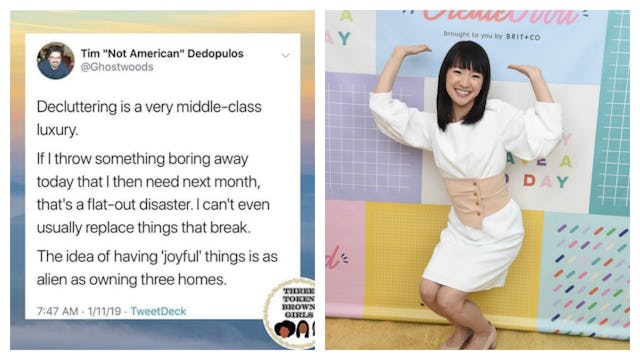The KonMari Method Doesn't Work For Some People

A few months ago when everyone and their grandmother started talking about Marie Kondo and her Netflix show Tidying Up, I rolled my eyes. I couldn’t quite pin down why I was so bothered by the idea of only keeping things that “spark joy.” But then it hit me: these people have enough stuff that they can throw away things that don’t make them happy. Not everyone has that luxury.
Yes, decluttering is a luxury — one that is steeped in privilege. It’s just another trend where people get all excited and then fall back into old habits when she’s gone.
Before the end of the year, I admit, I did “declutter” my house. Mainly I threw out old papers and broken dollar store toys and went through our drawers to purge my son’s clothes. Much of that was due to necessity — we live in a studio apartment. There’s only so much room, and things were getting out of control. But I also understood how lucky I was to be able to purge things like clothes.
When you’re poor, you don’t have the luxury of throwing clothes away or donating them because they’re taking up space. Most of the clothes in my wardrobe are older than my son, who is five. I still have clothes I bought not long after a graduated college, and I’ve been out of college for ten years. As a single parent, buying myself new clothes is something I can’t usually afford. This year I knew my family was giving me money to get myself a few things for Christmas, so I allowed myself to finally say goodbye to some of the clothes that had gotten me through tough times. They had seen better days, that’s for sure.
I was extremely lucky to be in a position financially where I could get rid of clothes. I can’t say most of them “spark joy” in me, but they fit, they’re not stretched out and they don’t have holes. When I have extra money for clothes, it usually has to go to my son who grows like a weed. There was definitely a point where he was wearing pants that were too short because we just didn’t have money for new ones. Did that bring me joy? No, it actually brought me guilt and sadness. But, we made the best of it. I cuffed them and made them fashionable and hoped nobody was the wiser.
For all of these reasons, this Instagram post and tweet resonated with me. Living in poverty — or something close to it — doesn’t give you the space to do something as simple as get a new pack of socks.
Poor people see the monetary value in everything they own. That’s why we take painstaking care of everything. Because we know what happens if something breaks or rips, we don’t often have the money to replace it. The money is always tied up in something else, or simply isn’t there at all. That goes triple for something that doesn’t need to be thrown away.
Being able to walk through your house and look at something that doesn’t make you happy and be able to rid yourself of it is a concept steeped in privilege. First of all, there’s the privilege of having “stuff” as opposed to only things you need. The mere accumulation of stuff is a concept poor people don’t fully understand. We can’t buy things “just because.” We can barely afford the basic necessities, and likely lack the means to replace something if it does break. Everything has to have a purpose.
Most poor people are constantly living in survival mode. Often, that means holding onto things they may not need right then, because there’s a chance they may need it in the future (and lack the funds to buy it). Decluttering would not give them “peace of mind;” it would just be another stressor added to their plates. It’s one thing to throw out something that is legitimately broken — but it’s asking a lot to go through all of your possessions and give them a purpose in your life. There’s a good chance many of these items don’t “spark joy,” but it’s more complicated than that for poor folks.
Clutter, in and of itself, is a middle-class concept. When you hear the word, you automatically think “unnecessary.” Clutter is having four picnic baskets in your closet when you don’t even go on picnics. Or holding onto something outdated because you’ve bought the newest version. Poor people aren’t buying things unless they absolutely need, and happen to have the funds, for them. They don’t have room for frivolity.
Even when you’re looking at it from a logistical position, if part of the KonMari method is to purposefully store the items you own, that could still be difficult for poor families. Living in a tiny, studio apartment with a child is a challenge, but it’s what we can afford. I try to store all of his toys and our clothes, but space is limited. Storing everything purposefully takes time and space. Space that we don’t have. And buying additional storage materials is money and I just don’t have to spend unless it is absolutely necessary.
Look, no one is saying Marie Kondo or her method are bad. But we have to see how the mentality of decluttering and being mindful of your space are incredibly privileged and classist. For a poor person who is literally in financial survival mode, simply telling them to “spark joy” in their space is ignorant to their very real life situation. The KonMari method requires labor many poor people just don’t have the energy, time or resources for. We must acknowledge how unrealistic it is for so many people.
This article was originally published on